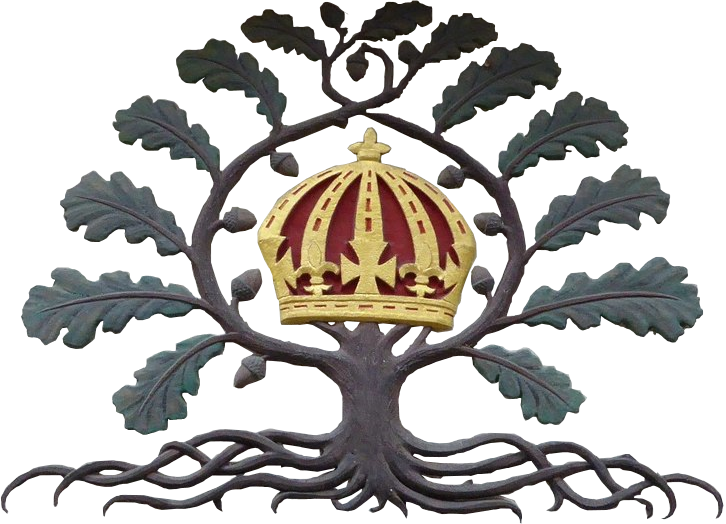See also
- List of monarchist movements by country
- Royal Stuart Society (aka the Royalist League), founded 1928; seeking restoration of the House of Stuart as the ruling house of Great Britain
- Monarchists
- Royalists
Monarchist League may refer to:
In political science, a reactionary or a reactionist is a person who holds political views that favour a return to the status quo ante, the previous political state of society, which that person believes possessed positive characteristics absent from contemporary society. As a descriptor term, reactionary derives from the ideological context of the left–right political spectrum. As an adjective, the word reactionary describes points of view and policies meant to restore a past status quo ante.
A royalist supports a particular monarch as head of state for a particular kingdom, or of a particular dynastic claim. In the abstract, this position is royalism. It is distinct from monarchism, which advocates a monarchical system of government, but not necessarily a particular monarch. Most often, the term royalist is applied to a supporter of a current regime or one that has been recently overthrown to form a republic.

Orléanist was a 19th-century French political label originally used by those who supported a constitutional monarchy expressed by the House of Orléans. Due to the radical political changes that occurred during that century in France, three different phases of Orléanism can be identified:

Action Française is a French far-right monarchist political movement. The name was also given to a journal associated with the movement.
The International Monarchist League is an organisation dedicated to the preservation and promotion of the monarchical system of government and the principle of monarchy worldwide. It has been active in advocating the restoration of the monarchy in countries that have become republics in the twentieth century, particularly since the Second World War. The League is based in the United Kingdom.

The Legitimists are royalists who adhere to the rights of dynastic succession to the French crown of the descendants of the eldest branch of the Bourbon dynasty, which was overthrown in the 1830 July Revolution. They reject the claim of the July Monarchy of 1830–1848 which placed Louis Philippe, Duke of Orléans, head of the Orléans cadet branch of the Bourbon dynasty, on the throne until he too was dethroned and driven with his family into exile.

Vietnamese Constitutional Monarchist League is a monarchist and anti-communist organization that seeks to restore the Nguyễn Dynasty to the throne under a constitutional monarchy, as in Cambodia and Thailand. The VCML's position is that Emperor Bảo Đại was the last legitimate ruler of Vietnam. Bảo Đại and his children do not support the VCML or their political aspirations.

Czech Crown is a Czech monarchist political party that strives for the restoration of Czech monarchy with the House of Habsburg-Lorraine. The party was founded in 1990 and its current leader is Radim Špaček. In the 2017 Czech legislative election Koruna Česká ran in a coalition with TOP 09 and received 5.35% of the votes. In the 2019 European Parliament election it ran together with KDU-ČSL and received 7.24% of the votes.

The Parliamentary Monarchist Party (PMP) is a small royalist party in Burundi which seeks the restoration of the monarchy, deposed in a coup in 1966. It was founded by Guillaume Ruzoviyo in August 2001. The party has no elected representatives in parliament and Guillaume Ruzoviyono has not held a government post since the end of 2005, but the PMP rallied in a coalition of 10 parties at the 2010 general elections, and obtained the management of the Burundi Embassy in Russia. PMP is member of International Monarchist Conference.
The Australian Monarchist League is an incorporated nonprofit organisation, headquartered in Sydney, Australia, promoting and educating on the Australian Constitution and monarchy. The organisation was part of the "no" campaign in the 1999 republic referendum, which asked whether Australia should become a republic and whether Australia should alter the constitution to insert a preamble. Neither of the amendments passed.

The 16 May 1877 crisis was a constitutional crisis in the French Third Republic concerning the distribution of power between the president and the legislature. When the royalist president Patrice MacMahon dismissed the Opportunist Republican prime minister Jules Simon, the parliament on 16 May 1877 refused to support the new government and was dissolved by the president. New elections resulted in the royalists increasing their seat totals, but nonetheless resulted in a majority for the Republicans. Thus, the interpretation of the 1875 Constitution as a parliamentary system prevailed over a presidential system. The crisis ultimately sealed the defeat of the royalist movement, and was instrumental in creating the conditions of the longevity of the Third Republic.

The Royal Stuart Society, founded in 1926, is the senior royalist-monarchist organisation and the foremost Jacobite body in the United Kingdom. Its full name is The Royal Stuart Society and Royalist League although it is best known simply as the "Royal Stuart Society." It acknowledges Francis, Duke of Bavaria as head of the Royal House, while refraining from making any claim on his behalf that he does not make himself.

The Coup of 18 Fructidor, Year V, was a seizure of power in France by members of the Directory, the government of the French First Republic, with support from the French military. The coup was provoked by the results of elections held months earlier, which had given the majority of seats in the country's Corps législatif to royalist candidates, threatening a restoration of the monarchy and a return to the ancien régime. Three of the five members of the Directory, Paul Barras, Jean-François Rewbell and Louis Marie de La Révellière-Lépeaux, with support of foreign minister Charles Maurice de Talleyrand-Périgord, staged the coup d'état that annulled many of the previous election's results and ousted the monarchists from the legislature.
The 1993 Brazilian constitutional referendum was held on 21 April 1993 to determine the form of government of the country. After the re-democratization of Brazil, an article in the new Constitution determined the holding of a referendum for voters to decide if the country should remain a republic or become a monarchy again, and if the system of government should be presidential or parliamentary. Voting for "monarchy" and "presidentialism" in tandem would annul one's vote.

The Monarchy of the North, officially the Kingdom of Portugal, was a short-lived counter-revolution against the First Portuguese Republic and a monarchist government that occurred in Northern Portugal in early 1919. It was based in Porto and lasted from 19 January to 13 February 1919. The movement is also known by the derogatory term Traulitânia.

Monarchism is the advocacy of the system of monarchy or monarchical rule. A monarchist is an individual who supports this form of government independently of any specific monarch, whereas one who supports a particular monarch is a royalist. Conversely, the opposition to monarchical rule is referred to as republicanism.

The movement for the re-adoption of monarchy in Brazil has taken place as a series of uprisings and political acts, usually in a fragmented way and peripherally to larger causes. It has been important historically and remains a fast-growing active movement to this day. It advocates restoration of the constitutional monarchy under the House of Orléans-Braganza, a cadet branch of the House of Braganza, which ruled Brazil for 67 years as the Empire of Brazil until the monarchy was abolished in 1889 by a military coup d'état that gave rise to the First Brazilian Republic.
The Neo-Jacobite Revival was a political movement that took place during the 25 years before the First World War in the United Kingdom. The movement was monarchist, and had the specific aim of replacing British parliamentary democracy with a restored monarch from the deposed House of Stuart.
The Order of the White Rose was a Jacobite society founded in 1886 by Bertram Ashburnham as a successor to the Cycle Club. The Order attracted many writers and artists and began the Neo-Jacobite Revival that flourished in the 1890s. The Order closed during the First World War, but in 1926 the Royal Stuart Society was formed to carry on its ideal and mission.